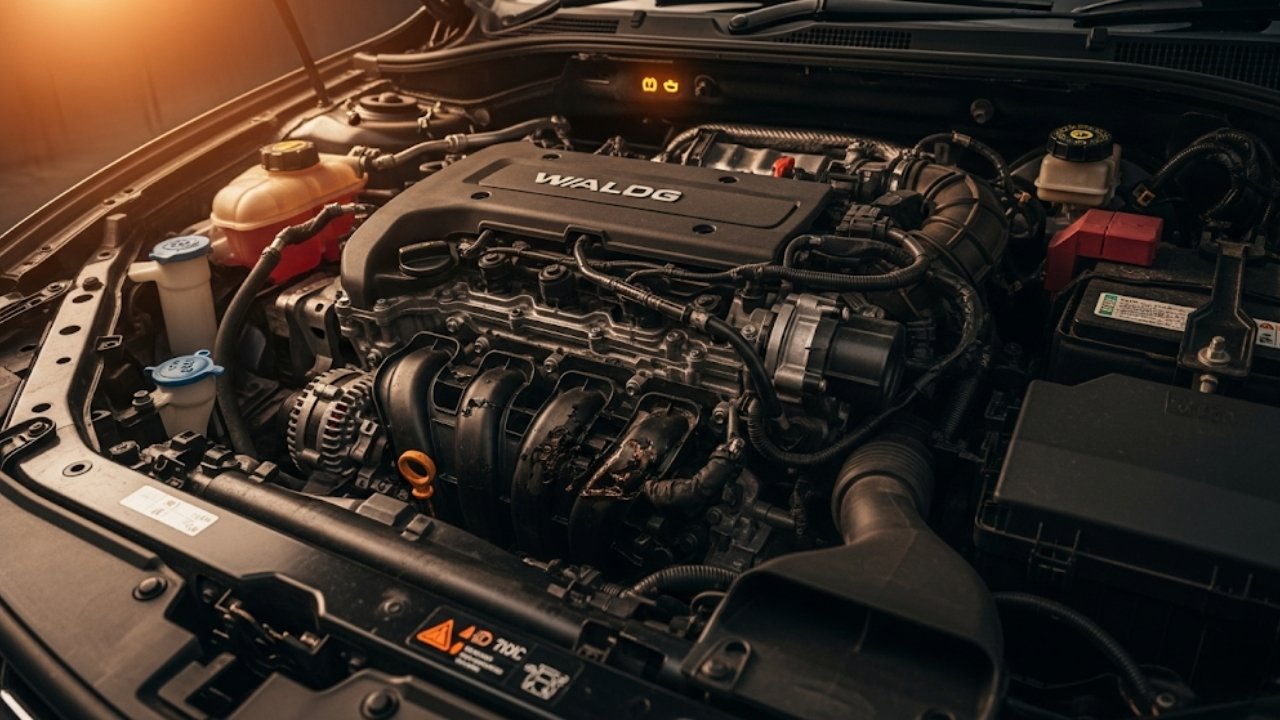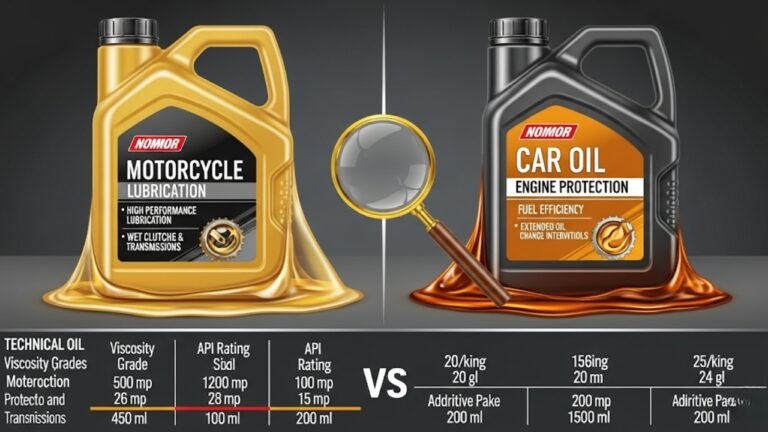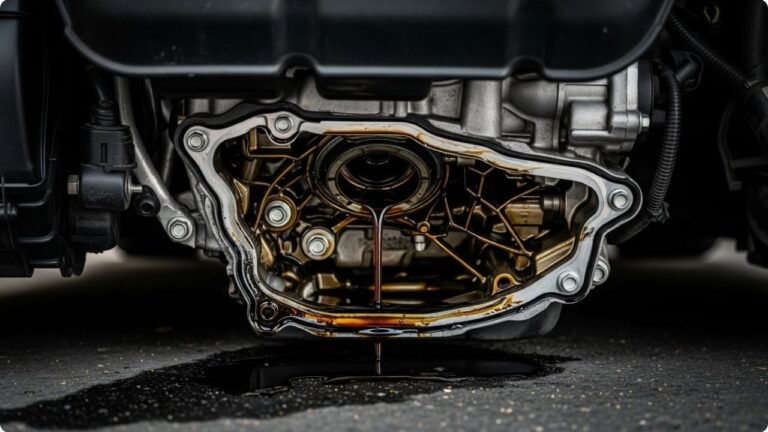What If Car Runs Out of Oil? – A Complete Guide

It happened to me once—on a hot summer day, miles away from any town, my car came to a slow, grumbling stop. I had ignored the oil warning light, assuming I could go “just a little further.” The result? A dead engine, a towed car, and a burned wallet.
If you’ve ever asked yourself, “what if car runs out of oil?”, trust me, you’re not alone. Many people don’t realize how fast things can go from smooth cruising to engine failure—all because of oil, that seemingly small yet mighty fluid.
This article will walk you through every detail about what really happens when your car runs out of oil, how to recognize the warning signs, and how you can prevent the disaster that I didn’t. Whether you’re a new driver or a seasoned gearhead, this guide will equip you with real-world insights, simple explanations, and emotional relatability.
Why Engine Oil Is the Heart of Your Car

Engine oil does more than just lubricate the parts. It also:
-
Reduces friction
-
Prevents overheating
-
Cleans out debris and contaminants
-
Forms a seal between piston rings and cylinder walls
-
Cushions engine parts from damage
Imagine your heart pumping blood without oxygen. That’s what happens when your engine runs without oil.
Without proper lubrication, engine metal components rub directly against each other. That rubbing produces heat. Too much heat causes warping, fusing, and eventually—catastrophic damage. If you’ve ever seen an engine seized up like a rusted gear, it probably ran out of oil.
Key takeaway: Never ignore your oil level. Even a short drive without oil can cause thousands of dollars in damage.
What Happens If Car Runs Out of Oil?
Let’s go deep into the big question: what if car runs out of oil completely?
When your vehicle runs dry on oil, several things happen in a specific, dangerous sequence:
1. Friction Builds Quickly
With no oil, moving parts like the crankshaft, camshaft, and pistons grind together. This happens within seconds. You’ll notice weird noises—rattling, ticking, or loud knocking. It’s your car screaming for help.
2. Heat Takes Over
Without oil to reduce heat, temperatures soar. The engine will start to overheat fast. This can melt metal parts and destroy the head gasket, which leads to coolant mixing with oil—a deadly combo.
3. Parts Start to Fail
As components overheat and grind, they can break or seize. The engine might stall or shut off altogether. When it does, it might not start again—ever.
4. Engine Seizure
This is the final stage. The engine is literally locked. Pistons are stuck, metal is fused, and your engine becomes a giant, expensive paperweight.
Here’s a simple breakdown in a table format:
| Stage | Time After Oil Loss | What Happens | Damage |
|---|---|---|---|
| Friction Begins | 10–30 seconds | Grinding, ticking noises | Minor to moderate |
| Heat Buildup | 30–90 seconds | Overheating, oil light on | Gasket or valve damage |
| Component Breakdown | 1–3 minutes | Stalling, poor performance | Serious internal wear |
| Engine Seizure | 3–5 minutes | Complete failure | Full engine replacement |
Important: Every car is different, and this timeline varies based on temperature, engine type, and condition. But one truth remains—you don’t have much time once the oil is gone.
Real Signs Your Car Is Running Out of Oil
I wish I had paid attention to the signs. Most cars do warn you, but we often ignore them.
Here are the most common warning signs:
-
Oil warning light on dashboard
-
Burning oil smell
-
Engine noise—especially tapping or knocking
-
Smoke from the hood
-
Overheating temperature gauge
-
Rough idling or sluggish performance
If you notice any of these, pull over immediately. Driving “just a bit more” could mean replacing your entire engine.
Think of it like ignoring chest pain and deciding to walk it off. Bad idea, right? Same thing here.
Common Causes Why Car Runs Out of Oil
You might be wondering: “Why would a car suddenly run out of oil?”
Good question! It doesn’t always happen from neglect. Sometimes it sneaks up on you.
Here are common reasons:
-
Oil leaks – Tiny leaks from seals or gaskets add up over time
-
Worn piston rings – Burn oil slowly without visible smoke
-
Neglecting oil changes – Old oil breaks down and can evaporate
-
Driving too much – Long trips without maintenance lead to low levels
-
Cracked oil pan – Usually from hitting a bump or rock
Pro tip: Always check your oil level once a month. It takes 2 minutes and can save you $2000 or more.
Can You Still Drive If Oil Is Low But Not Empty?
This one’s tricky.
Technically, yes—you can still drive if oil is low. But should you? Absolutely not.
Here’s what I learned the hard way. When the oil is low, the pump can’t circulate it properly. That means even though there’s some oil in the system, it’s not enough to protect all the parts. The damage may be slow, but it’s real.
Symptoms when oil is low:
-
Diminished acceleration
-
Engine hesitation
-
Increased noise
-
Oil pressure warning light flickers
-
Fuel economy drops
And don’t trust the oil light alone. It usually comes on when pressure is already too low, not just when oil is missing. Always check with a dipstick.
How to Check and Top Up Engine Oil – A Simple DIY Lifesaver
If there’s one habit that can save your car’s life, this is it: check your engine oil regularly. It’s quick, free, and surprisingly easy—even for beginners.
Here’s how I do it (you can too!):
-
Park your car on a flat surface.
-
Turn off the engine and let it sit for at least 5 minutes to cool down.
-
Open the hood and find the oil dipstick (usually has a yellow or orange ring).
-
Pull it out, wipe it clean with a cloth or tissue.
-
Reinsert it fully, then pull it out again and check the level.
-
The stick has two marks: Low and Full. Your oil should be between them.
If it’s low:
-
Find the oil cap (marked “engine oil”).
-
Add a little oil using a funnel—about half a quart at a time.
-
Wait 1-2 minutes and check the dipstick again.
-
Repeat until it’s safely in the right range.
✅ Tip: Always use the right oil grade and type as listed in your car’s manual. Using the wrong oil can cause other problems like reduced mileage or internal wear.
What To Do If You Already Ran Out of Oil
So, the damage is done. Your car ran out of oil, and it either stalled or shut off. What now?
Don’t panic. Follow these steps:
1. Turn Off the Engine Immediately
If it hasn’t already stopped, shut it off now. Letting it run any longer worsens damage.
2. Check the Oil Level
Use the dipstick. If it’s dry, that confirms it—you’re out of oil.
3. Add Oil—But Don’t Start the Car Yet
Add the correct oil until the dipstick shows the proper level. But don’t start the car immediately. First, inspect for leaks under the vehicle.
4. Look for Warning Signs
Even after adding oil, listen carefully. If the engine is still knocking, won’t turn over, or makes strange sounds—call a mechanic.
5. Tow It to a Trusted Garage
If the engine is seized, you’ll need professional help. A mechanic can assess the damage and recommend repair or replacement options.
Can a Car Be Fixed After Running Out of Oil?
This depends on how long it ran without oil and the damage done.
✅ If you caught it early:
-
You may only need to replace some bearings, or flush and refill the oil system.
-
Cost: $100–$500
⚠️ If the engine seized:
-
You’re looking at major repairs, like rebuilding the engine or installing a new one.
-
Cost: $2000–$7000+
Sometimes, especially with older cars, it’s not worth fixing. That’s the cold truth. I once sold a car for scrap after an oil-related engine failure. It wasn’t easy. I had memories with that car. But the repair cost was more than the car’s value.
A Personal Lesson: My Costly Mistake
Let me tell you a true story from a few years ago.
I had just returned from a road trip. The car had made it through mountains, valleys, and endless highways. But I never once checked the oil.
One morning, I started the engine—and it just clunked, then died. I thought it was the battery, but the oil light had been on the last few miles of the drive. I ignored it.
The diagnosis? Engine seizure due to zero oil pressure.
It cost me $3200 and weeks without a car. Worse, I felt ashamed. I was always the “car guy” in my group. But I learned the hard way: oil isn’t optional—it’s oxygen for your engine.
Professional Fix or DIY – What’s the Best Route?
Sometimes it’s tempting to fix things yourself, especially with YouTube tutorials. But when it comes to engine damage from running out of oil, this is usually not a DIY project.
Go DIY if:
-
You’re topping up oil or doing a simple oil change.
-
You have experience with engine work.
-
You’re comfortable diagnosing internal wear.
Call a pro if:
-
The engine won’t start even after adding oil.
-
You hear loud knocking or grinding.
-
Oil leaked out and you don’t know where.
-
The car shut off while driving and won’t restart.
Bottom line: You can DIY the prevention. But if you’ve already run out of oil and caused damage, trust the pros.
FAQs: What If Car Runs Out of Oil?
1. How long can a car run without oil?
Not long—only 30 seconds to a few minutes before severe damage sets in.
2. Will adding oil fix a car that ran out of oil?
It may help if you catch it early, but if the engine has already seized, adding oil won’t fix it.
3. Can you restart a car that ran out of oil?
Possibly, but only if no damage occurred. Always check the oil level first, then proceed cautiously.
4. What does engine seizure feel like?
You’ll hear loud knocking or grinding. The engine may suddenly stop and refuse to turn over again.
5. Can an oil change prevent this?
Absolutely. Regular oil changes keep your engine protected and functioning properly.
6. How often should I check my oil?
At least once a month or before long trips. It only takes a minute!
7. Is synthetic oil better?
Synthetic oil lasts longer and handles heat better, making it ideal for modern engines—but always follow your manufacturer’s recommendation.
8. Does low oil affect fuel economy?
Yes. Low or old oil increases engine strain, which reduces fuel efficiency and performance.
Final Thoughts: Oil Is Cheap, Engines Aren’t
I’ll say it again—don’t underestimate the power of engine oil. We often take it for granted because it’s not flashy. It doesn’t rev like a turbo or shine like new rims. But it’s what keeps everything working smoothly.
If you’ve been asking, “what if car runs out of oil?”, now you know:
-
It can ruin your engine in minutes.
-
The warning signs are real—pay attention.
-
Prevention is simple and affordable.
-
Repairs are often costly and stressful.
Think of oil like your car’s life force. Treat it with care, and your vehicle will return the favor.






